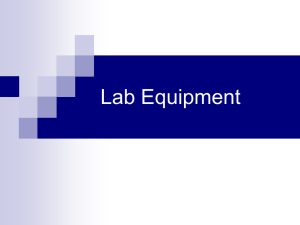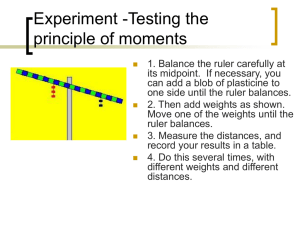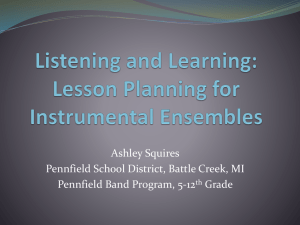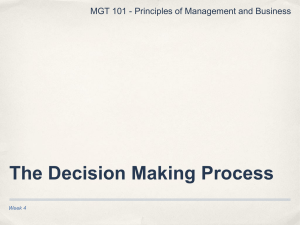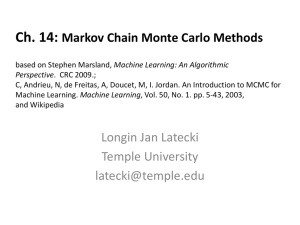pptx - Maciej KURANT
advertisement
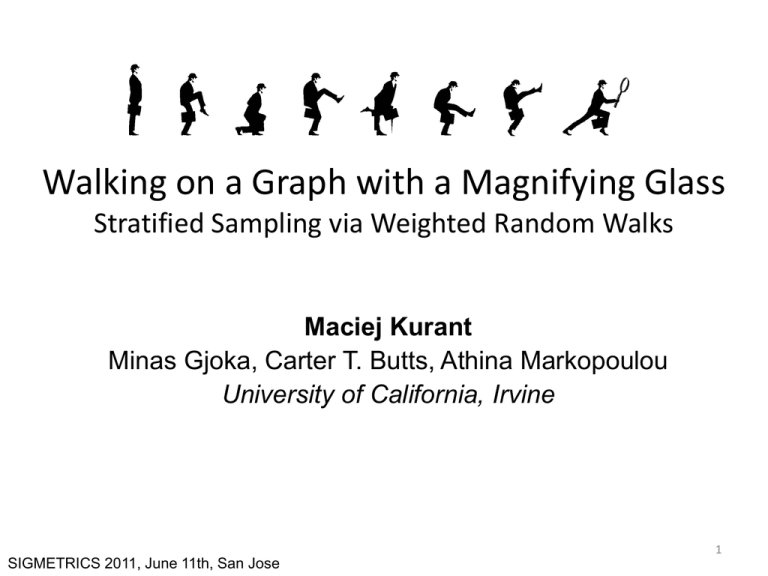
Walking on a Graph with a Magnifying Glass Stratified Sampling via Weighted Random Walks Maciej Kurant Minas Gjoka, Carter T. Butts, Athina Markopoulou University of California, Irvine 1 SIGMETRICS 2011, June 11th, San Jose Online Social Networks (OSNs) October 2010 Size Traffic 500 million 2 200 million 9 130 million 12 100 million 43 75 million 10 75 million 29 > 1 billion users (over 15% of world’s population, and over 50% of world’s Internet users !) 2 Facebook: • 500+M users • 130 friends each (on average) • 8 bytes (64 bits) per user ID The raw connectivity data, with no attributes: • 500 x 130 x 8B = 520 GB To get this data, one would have to download: • 100+ TB of (uncompressed) HTML data! This is neither feasible nor practical. Solution: Sampling! 3 Sampling What: • Topology? 4 Sampling What: • Topology? • Nodes? How: • Directly? Sampling What: • Topology? • Nodes? How: • Directly? • Exploration? 6 Sampling What: • Topology? • Nodes? How: • Directly? • Exploration? E.g., Random Walk (RW) 7 A Random Walk in Facebook Random Walk (RW): Apply the Hansen-Hurwitz estimator: Real average node degree: 94 Observed average node degree: 338 degree of node s [1] M. Gjoka, M. Kurant, C. T. Butts and A. Markopoulou, “Walking in Facebook: A Case Study of Unbiased Sampling of OSNs”, INFOCOM 2010. Related Work RW in online graph sampling: • WWW [Henzinger et at. 2000, Baykan et al. 2009] • P2P [Gkantsidis et al. 2004 , Stutzbach et al. 2006, Rasti et al. 2009] • OSN [Rasti et al. 2008, Krishnamurthy et al, 2008, Gjoka et al. 2010] RW mixing improvements: • Random jumps [Henzinger et al. 2000, Avrachenkov, et al. 2010] • Fastest Mixing Markov Chain [Boyd et al. 2004] • Multiple dependent walks [Ribeiro et al. 2010] • Multigraph Sampling [Gjoka et al. 2011] What if the nodes are not equally important in our measurement? Not all nodes are equal Node categories: important (equally) important irrelevant Stratification under Weighted Independence Sampler (WIS) (node size is proportional to its sampling probability) 11 Not all nodes are equal Node categories: important (equally) important irrelevant Example (node size is proportional to its sampling probability) 1 : Compare the relative n red n green Example Stratification under Weighted Independence Sampler (WIS) n sizes of red and green categories (the same number of red and green samples, : no blue samples) 2 2 : Calculate the averages red and green . red 2 To minimize max( Var( ˆ red ), Var( ˆ green )), we need n red To minimize Var( ˆ red ) Var( ˆ green ), we need n red red green 2 red red green 2 n. n. 12 Not all nodes are equal Assumption: On sampling a node, we learn categories of its neighbors. Node categories: important (equally) important irrelevant But graph exploration techniques have to follow the links! Stratification under Weighted Independence Sampler (WIS) (node size is proportional to its sampling probability) Enforcing WIS weights may lead to slow (or no) convergence Fastest Mixing Markov Chain [Boyd et al. 2004] Trade-off between • ideal (WIS) sampling weights • fast convergence 13 Initialization: Pilot Random Walk Pilot Random Walk (RW) • Use classic Random Walk (RW) Pilot Random Walk (RW) • Use classic Random Walk (RW) • Collect a list of existing relevant and irrelevant categories Pilot Random Walk (RW) • Use classic Random Walk (RW) • Collect a list of existing relevant and irrelevant categories • Estimate the relative volume of each category Ci : Pilot Random Walk (RW) • Use classic Random Walk (RW) • Collect a list of existing relevant and irrelevant categories • Estimate the relative volume Volume : vol ( C i ) deg( v ) v C i Relative f vol i volume vol ( C i ) vol (V ) of each category Ci : vol ( red ) 4 vol ( green ) 20 : vol ( blue ) 22 f vol red vol f green f vol blue 4 46 20 46 22 46 Pilot Random Walk (RW) • Use classic Random Walk (RW) • Collect a list of existing relevant and irrelevant categories • Estimate the relative volume of each category Ci : Volume : vol ( C i ) deg( v ) v C i Relative f vol i vol ( red ) 4 volume vol ( C i ) vol ( green ) 20 : vol ( blue ) 22 f vol red vol f green f vol blue 4 46 20 46 22 46 vol (V ) RW-based estimator: # of neighbors of u in Ci : • Efficient! • No need to visit Ci at all! The size of sample S • Estimation errors do not bias the ultimate measurement result (but they may increase its variance) 19 Stratified Weighted Random Walk Measurement objective E.g., compare the size of red and green categories. 21 Measurement objective E.g., compare the size of red and green categories. Stratified sampling theory + Category weights optimal under WIS Information collected by pilot RW 22 Measurement objective E.g., compare the size of red and green categories. Category weights optimal under WIS Modified category weights Problem 1: Poor or no connectivity Problem 2: “Black holes” Solution: Small weight>0 for irrelevant categories. f* -the fraction of time we plan to spend in irrelevant nodes (e.g., 1%) Solution: Limit the weight of tiny relevant categories. Γ - maximal factor by which we can increase edge weights (e.g., 100 times) Measurement objective Category weights optimal under WIS Modified category weights Edge weights in G E.g., compare the size of red and green categories. Target edge weights: 20 = 22 = 4 = vol(green), from pilot RW * Measurement objective Category weights optimal under WIS Modified category weights E.g., compare the size of red and green categories. Target edge weights: 20 = Edge weights in G Resolve conflicts: • arithmetic mean, • geometric mean, • max, •… 22 = 4 = Measurement objective Category weights optimal under WIS Modified category weights Edge weights in G WRW sample E.g., compare the size of red and green categories. Measurement objective E.g., compare the size of red and green categories. Category weights optimal under WIS Modified category weights Edge weights in G WRW sample Hansen-Hurwitz estimator Final result Measurement objective Category weights optimal under WIS Modified category weights Edge weights in G WRW sample Final result E.g., compare the size of red and green categories. Stratified Weighted Random Walk (S-WRW) Simulation results Simulation results NRMSE(size(red)) Simulation results RW Uniform weight w Tradeoff between fast mixing (~RW) and the weights optimal under Weighted Independence Sampler (WIS) Optimal under WIS NRMSE(size(red)) Simulation results weight w The larger the sample size n, the closer to WIS. Optimal under WIS Evaluation on Facebook Colleges in Facebook Samples in colleges: 86% of S-WRW, 9% of RW. This is because S-WRW avoids irrelevant categories. The difference is larger (100x) for small colleges. This is due to S-WRW’s stratification. RW discovered 5’325 colleges. S-WRW: 8’815 (not shown) College size estimation 13-15 times RW needs about 14 times more samples to achieve the same error! 14 ~= 9 x 1.5 irrelevant categories stratification 35 Walking on a Graph with a Magnifying Glass important (equally) important irrelevant Facebook datasets available from : http://odysseas.calit2.uci.edu/osn Example application: http://geosocialmap.com Thank you! Maciej Kurant, Minas Gjoka, Carter T. Butts and Athina Markopoulou, UC Irvine 36 Parameters f* : the fraction of time we plan to spend in irrelevant nodes: • f*=0 iff all nodes relevant, f*>0 otherwise. • f*<<1 • Exploit the pilot RW information. E.g., f* higher when relevant categories poorly interconnected • In Facebook, we used f*=1% Γ>=1 : maximal resolution of our “graph magnifying glass”: • Let B be the size of the largest relevant category. S-WRW will typically sample well all categories whose size is at least equal to B / Γ. • Think of the smallest category that is still relevant – this gives Γ. • Set Γ smaller for smaller sample size. • Set Γ smaller in graphs with tight community structure. • In Facebook, we set Γ=1000. In the paper, we show that S-WRW is quite robust to the choice of these parameters. Toy graphs
